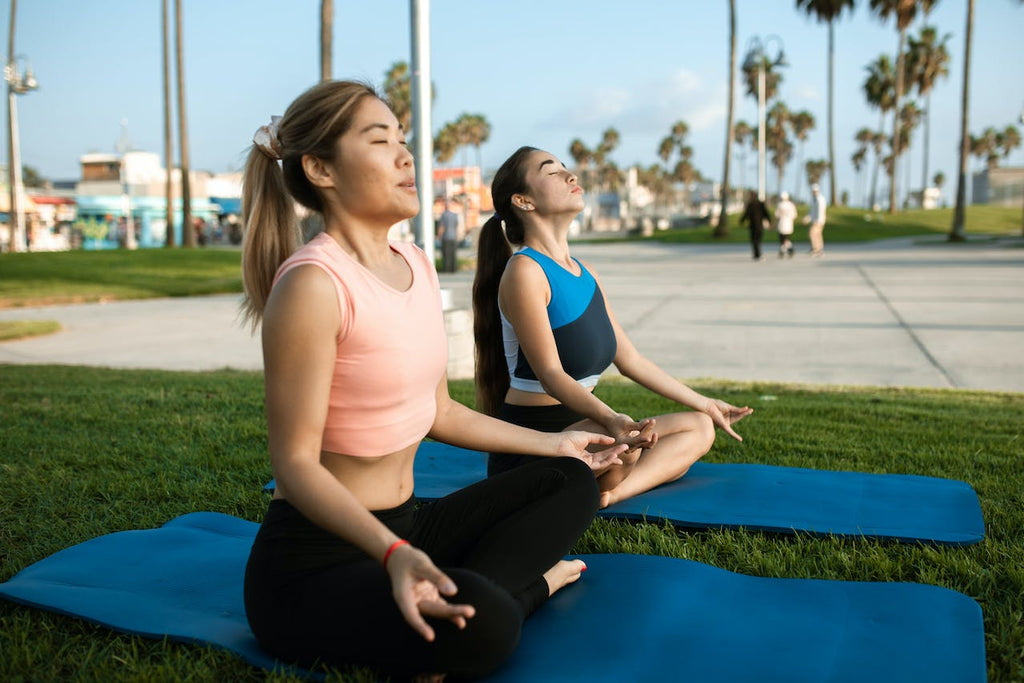Can meditation help breast cancer patients cope with stress?

Many of us have been either touched by someone in our lives who has been diagnosed with breast cancer or have been affected by the disease firsthand. The National Breast Cancer Foundation (NBCF) says that one in eight women will be diagnosed and that the disease ranks as the second most common type of cancer among women in the US (1)(2).
And while those numbers can feel scary, some hopeful news—thanks to improvements in early detection—is that breast cancer death rates declined 40% from 1989 to 2017 (3).
Yet even with these improvements, a journey with breast cancer—from the initial diagnosis to treatment—can be long, painful, and difficult. To help, meditation for cancer patients as well as other mindfulness practices are increasingly being recommended to help promote mental and emotional well-being through the course of their treatment (4). A 2019 study by the Mayo Clinic showed that meditation can improve fatigue, stress, and quality of life in patients with breast cancer (5).
Meditation for cancer patients: One study’s findings
A breast cancer diagnosis can dramatically affect a person’s quality of life and is often associated with increased levels of stress and fatigue (5). While past studies have shown meditation can be an effective tool for breast cancer survivors, factors such as a lack of access, high cost, time commitment, and adherence, have made it difficult for some to fully benefit (6).
In response, the Mayo Clinic study set out to take a closer look at a more affordable, accessible meditation option and what it could do for breast cancer patients. Specifically, the study looked at the use of the portable, wearable electroencephalographic (EEG) Muse device for guided meditation practice by breast cancer patients—from diagnosis up to 3 months after surgical treatment.
The study enrolled women ages 20-75 who had recently been diagnosed with breast cancer and planned to undergo surgery. Participants were randomly assigned to either practice guided meditation with the Muse device (intervention group) or receive stress-reduction education from a CD (control group). Surveys were then used to measure stress, quality of life, and fatigue at 4 different intervals: baseline, within 4 days before surgery, up to 14 days after surgery, and at three months after surgery.
The result?
- Participants using the Muse device showed less fatigue and stress as well as an improved quality of life at both 2 weeks and 3 months after surgery compared with their baseline.
- Further, the study showed the Muse device was as effective as the stress-reduction education in the control group (5).
- Another big win? Participants in the Muse control group also had a higher retention rate in sticking with a meditation practice afterwards.

Other science-backed benefits of meditation (& how it works)
In addition to helping reduce feelings of fatigue and stress, an abundant amount of research exists showing numerous other mental health, physical, and emotional benefits of a meditation practice in combination with other healthy lifestyle factors(7). These include reduced feelings of anxiety, as well as a boost in attention span, cognitive function, and memory (8).
And the good news is you don’t have to disappear to an ashram or carve out hours a day to gain the benefits. Studies show as little as five minutes of meditation can do the job (9).
KEY TAKEAWAY: What’s key is keeping some consistency in your practice. Five minutes a day is more effective than just one hour on Sundays.
After all, mediation isn’t about “stopping thinking.” Instead, its power comes in its ability to help us untangle our thoughts and our emotions associated with them. It teaches us to distance ourselves from our reaction to our pain, stress, or whatever it is and simply stay present. So it makes sense that the more often we practice observing our emotions and sensations without judgment, the easier it will be to react less, and the more we’ll benefit (9).
NBCF & Muse helping breast cancer patients together
To help make meditation more accessible, we’ve partnered with the National Breast Cancer Foundation to help patients work through their journey with breast cancer. Our world-renowned teachers have created a special Cancer Comfort Collection from our Meditation Studio app that’s free to all NBCF supporters, located on their wellness page. Included in the collection are mediations like “Managing Chronic Pain,” “Breath as Ally,” and “Building Strength and Resilience.”
And while meditation can’t be a cancer cure, it can help reduce feelings of stress, anxiety, and pain associated with the disease as well as boost feelings of calm, resilience, and compassion for those most difficult times in our lives. You can access the Cancer Comfort Collection for free on the National Breast Cancer Foundation wellness page. For Muse Subscribers, access it on the Muse app.
References:
- 2020, April 15. Breast Cancer Facts. National Breast Cancer Foundation. https://www.nationalbreastcancer.org/breast-cancer-facts
- 2020, June 8. Breast Cancer Statistics. Centers for Disease Control and Prevention. https://bit.ly/32tA4nG
- 2019, October 2. Report: Breast Cancer Death Rates Down 40% Since 1989. (Blog post). American Cancer Society. https://bit.ly/3eX0Z0d
- Physical Activity, Wellness & Nutrition. National Breast Cancer Foundation. https://www.nationalbreastcancer.org/breast-cancer-nutrition
- Millstine, Denise M., MD; Bhangra, Anjali, M.D.; Jenkins, Sarah M., MS; Croghan, Ivana T., PhD; Stan, Daniela L., MD; Boughey, Judy C., MD; Nguyen, Minh-Doan T., MD, PhD; Pruthi, Sandhya, MD. 2019, September 30. Use of a Wearable EEG Headband as a Meditation Device for Women With Newly Diagnosed Breast Cancer: A Randomized Controlled Trial. https://www.ncbi.nlm.nih.gov/pmc/articles/PMC6769228/
- Doheny, Kathleen. 2016, June 2. Meditation Can Help Breast Cancer Survivors. (Blog post). https://www.webmd.com/breast-cancer/news/20160602/mindfulness-meditation-seems-to-soothe-breast-cancer-survivors
- Rosenkranz, Melissa A.; Davidson, Richard J.; MacCoon, Donal G.; Sheridan, John F.; Kalin, Ned H.; Lutz, Antoine. A comparison of mindfulness-based stress reduction and an active control in modulation of neurogenic inflammation. https://www.sciencedirect.com/science/article/abs/pii/S0889159112004758
- 2020, October 27. 12 Science-Based Benefits of Meditation. (Blog post). Healthline. https://www.healthline.com/nutrition/12-benefits-of-meditation#10.-Helps-control-pain
- 2020, March 10. New Study for Novice Meditators: Learning to Stress Less. (Blog post). Muse. https://choosemuse.com/blog/learning-to-stress-less/
